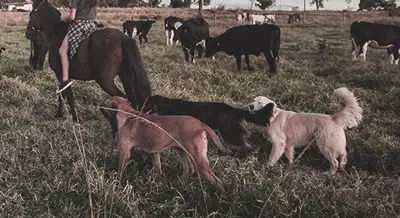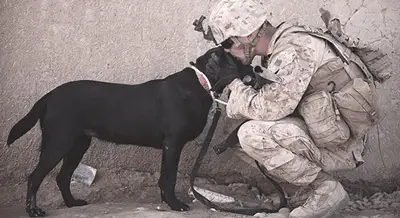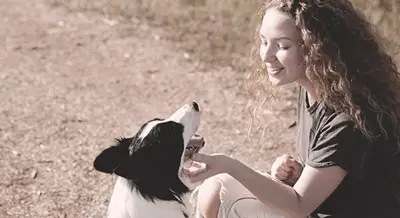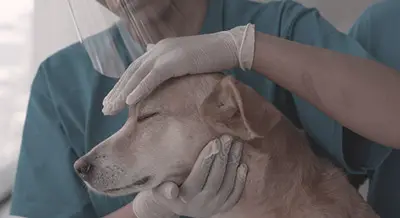There are so many different types of dog handlers in the world. From professional trainers to everyday dog owners, everyone has their unique way of interacting with and training their pup. So, what are the most common types of dog handlers? According to experts, here are the 10 most common…
Herding dog trainers.

They train pups to round up livestock, which is something that requires a great deal of patience and knowledge.
These handlers are professionals that know how to get the maximum result from their pup while also teaching him/her how to work independently.
The bond between herding dog trainers and their pups is often very strong because it takes so much time for both parties to learn what works best together.
Herding dogs are among the smartest and most obedient of all dog breeds because a dog that knows how to herd is a dog that can protect livestock from predators. For centuries, herding has been a job for man’s best friend, who learned to work with people rather than compete against them. Trained properly, sheepdogs will work together with their masters around livestock without nipping at or chasing them in any way.
Law Enforcement.
As the name implies, law enforcement handlers are responsible for training police dogs. Their job is to prepare these pups to track down criminals and sniff out drugs, bombs, and more. These handlers need to work with their dog both in and out of the criminal justice system. Many law enforcement handlers study criminal justice to understand their dog’s target better.
Dog handlers with law enforcement are often some of the best trained in the field. They have to pass physical/obstacle tests just like their dogs, and they receive ongoing training to stay sharp and learn new techniques. They work with canines in every environment, from the streets to the mountains. They truly are the best of the best handlers.
Urban Search and Rescue.
Urban search and rescue handlers, as their name suggests, specialize in training pups for rescue missions. These handlers train their dogs to track missing people and search for corpses. Their duties involve searching collapsed buildings and other dangerous areas to find people who may or may not be alive.
These handlers need to keep their pup in top physical condition, so they have to be ready to work for hours at a time. They also need to know how to communicate with their pups effectively since most of their work is done through hand signals. These handlers are the best-trained in the field, and they love what they do.
Working with a dog can be a gratifying experience, but it requires a lot of time and effort. Not only do handlers have to train their dogs, but they have to be in great shape themselves. They need to study animal behavior and training, among other things, to learn how to prepare their pup for a successful future in the field.
Military.

Working with military dogs is different from working with police canines or rescue pups. Military handlers must train in all types of combat situations, many of which are difficult conditions. These handlers couldn’t do their job without the help of their dogs, which is why they need to know precisely what they’re doing.
The U.S. military offers several different courses for handlers that are designed to teach them everything they need to know about training dogs. These handlers also study canine care and veterinary medicine, so they know how to keep their pup in top shape. Military handlers are trained in the basics of dog psychology to understand their pups better and teach them new skills. More than other handlers, military dog trainers must be knowledgeable and ready for anything.
Animal Protection.
This handler type often rescues dogs from bad situations, such as puppy mills. Animal protection handlers know how important it is to educate the public about animals, so they work to get the message out there while also rescuing dogs. Some animal protection handlers work specifically with pit bulls and other types of dogs that others might not want to adopt.
An animal protection handler is basically a superhero who saves dogs from bad situations. These handlers have an extremely important job, and they know it, which is why they do everything they can to help animals. They work tirelessly to adopt pups and spread the word about animal cruelty, all while working with their canine best friends.
These handlers don’t have a typical job, but they have an important one. They work long hours, and they know the value of teamwork. They’re taught how to handle pups through special courses and hands-on experience, which is more than most people can say about their jobs! These handlers are some of the most respected in their field, and they’re always ready to help pups who need it.
Animal Control.
This is the type of handler most people are familiar with since they’re everywhere. These handlers work for local governments to rescue and care for lost or stray animals in their area. Animal control handlers also keep stray dogs off the street and away from residents since they know it’s vital for both the dogs and the people.
Since animal control handlers have a lot of responsibilities, they can never be short on work. These handlers spend their days running around their city to help animals, which means they need to be in great shape. They also stay busy with paperwork and other office tasks, so they need to be organized and efficient.
Being an animal control handler isn’t as easy as it looks on TV, but it’s worth it for the pups! These handlers are mostly unsung heroes, but they make a big difference in the lives of animals. They know that their job is essential and that every animal matters, so they work hard to ensure the streets are safe for everyone. And whether it’s rescuing a lost pup or keeping the streets clear of strays, animal control handlers are making sure all animals are happy, healthy, and well-cared for.
Working with animals is a challenging but rewarding experience. It takes a lot of work and understanding to successfully work with pups, which is why animal handlers need special training. This type of job isn’t for everyone, but it’s perfect for those who love animals and know how to handle them.
Animal Trainer.

Animal trainers are responsible for teaching their animals how to behave correctly. Whether they’re teaching dogs new tricks or teaching horses how to give pony rides, these handlers put in a lot of time and effort to ensure they’re doing everything right.
Trainers are responsible for training their pups and ensuring they’re healthy and happy. Trainers teach dogs the necessary skills and ensure that their behavior is appropriate for the situation. Trainers also evaluate each pup to see how they respond to different situations and ensure they’re safe.
Anyone who wants to become a trainer needs to be ready for anything! Trainers spend all of their time around their pups and in contact with potential customers, so they need to know how to keep themselves and their pups safe. Trainers often work with show dogs or service pups, requiring extensive training and qualifications.
Breeder.
Animal breeders are responsible for the birth and care of their animals. They’re in charge of making sure each pup is healthy, well-fed, and happy, but they’re also responsible for breeding new litters. Breeders take great care of their dogs and ensure that each pup is socialized correctly and cared for.
Breeders work with many different types of pups and animals every day, which means they need to be organized and handle different situations. They also need to know how to research their breeds since they’ll need information about everything from feeding and training to health and habits.
Anyone who wants to become a breeder needs to be ready for anything! Breeders spend all of their time around their pups and in contact with potential customers, so they need to know how to keep themselves and their pups safe. Breeders often work with show dogs or service pups, requiring extensive training and qualifications. Most breeders start as trainers or handlers before learning how to breed and care for dogs.
Animal Shelters.
Animal shelters are responsible for finding homes for their animals. These handlers take in everything from abandoned pups to abused horses, and they do whatever it takes to find them a new home.
Shelter workers need to be compassionate and caring, but they also need to handle stressful situations. Anyone who wants to work in an animal shelter needs extensive training and qualifications.
They’re in charge of taking care of all types of animals in need, which means they work with dogs, cats, rodents, birds, reptiles, and more!
Animal shelterers are responsible for obtaining food, ensuring each animal is healthy and safe, and ensuring that a new owner will be a good fit. They also need to ensure all animals are socialized so they can be adopted. Shelters often have to deal with difficult situations, so they need handlers who know how to handle all sorts of animals.
Animal Hospitalist.

Also known as veterinary technicians, animal hospitalists are responsible for animals’ daily care. These handlers check in on patients, help with surgeries, take x-rays, and do everything else that’s needed to keep animals healthy.
Hospitalists need to be able to handle any situation since they’re in charge of caring for sick or injured animals. They need to be patient and gentle, but they also need to know when it’s necessary to use force. Anyone who wants to work in an animal hospital needs extensive training.
Anyone who wants to become a hospitalist needs to be ready for anything! Hospitalists spend all of their time around animals and in contact with different patients, so they need to know how to keep themselves and their patients safe. Hospitalists often work with show animals or service pups, which means they require extensive training and qualifications.
Conclusion.
I hope you found this article informative and valuable. Most people who want to become professional animal handlers will do so by first learning how to train and care for animals.
Anyone who wants to become a professional animal handler will need to be ready for anything! Professionals spend all of their time around animals and in contact with an audience, so they need to know how to keep themselves and their animals safe. Animal handlers often work with show animals or service pups, which means they require extensive training and qualifications.
Do you know what it takes to become an animal handler?
Do you want to become one?
Do you think it’s worth all the effort, or it’s just not for you?
Let me know in the comments below!

Discover the dynamic world through the eyes of Joanna Perez: a celebrated Cognitive Behavioral Therapy Practitioner and an ardent blogger. Not just a writer, Joanna is also an explorer, partner, and a proud mother. Her expertise goes beyond penning thoughts on parenting, health, and lifestyle; she’s also a certified Women Empowerment Life Coach. With training in Life Mastery, Health, Happiness, and Success, she’s equipped to guide you through life’s complexities. Her dedication to education shines as she’s dived deep into the realms of Neuroscience for Parents and completed the Skilled Helper Training Course.
Reviewed By: Anna West and Brenda Tillman
Edited By: Lenny Terra
Fact Checked By: Marcella Raskin
Photos Taken or Curated By: Matthew Mansour